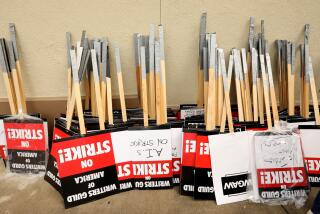TWA Attendants’ Odds of Regaining Jobs Dim
- Share via
NEW YORK — The strike of about 5,500 flight attendants against Trans World Airlines is now in its 39th day, and there appears to be no end in sight. With each passing day, a greater number of strikers are in jeopardy of never getting their jobs back.
TWA Chairman Carl C. Icahn has warned striking members of the Independent Federation of Flight Attendants that they would not be put back on the payroll if they had been replaced by newly hired personnel. And every day, more and more of these newly hired attendants are climbing aboard.
The airline says it is currently graduating between 20 and 40 new attendants a day from its training course in Kansas City, Mo. Icahn has promised these people, who were hired at substantially lower wage scales than their striking counterparts, that they will retain their jobs when the strike ends. There are 6,000 members of the striking union.
But the striking attendants say such threats may be no more than an attempt to get the union members to agree to the airline’s demands for concessions on pay and work hours. (TWA originally demanded pay cuts of 22%--later reduced to 17%--and changes in work rules. The union has offered to accept a 15% pay cut. The two sides have met three times with federal mediators, with no results.)
Usually Get Jobs Back
A union official said in an interview that traditionally, when new contracts are signed following labor disputes, a clause in the contract gives strikers a “back to work” opportunity.
“Of course, this (losing our jobs) is one of the things we have to consider as a possibility,” said Robert Baritz, a TWA flight attendant who is acting as a spokesman for the union. “But in other strikes of this magnitude, expressions have been made and promises have been made, but there is a good likelihood that they will be broken. Sometimes there have been legal actions, and they have held up in court.”
About 500 union members, or about 8% of the flight attendants, apparently have taken Icahn’s words to heart and have crossed the picket lines to return to work. As might be expected, they have greatly angered their striking colleagues. Flight attendants walking the picket lines maintain that they will ostracize their fellow workers and that an animosity between strikers and non-strikers will remain for many years to come.
“Their peers feel betrayed,” Baritz said. “They will feel uncomfortable (working with them) later on. One of the best tools is absolute silence. Those are the kind of people you don’t want to speak to.” Baritz said the union would fine those who crossed the picket lines once the strike is over.
Meanwhile, TWA says it is operating 100% of its regularly scheduled flights, but the company concedes that it is losing several hundred thousand dollars a day during the strike. TWA’s load factor, or percentage of seats filled, during March was 60.5%, compared to 74.6% in March, 1985 (when TWA benefited from a strike at rival Pan American World Airways).
Crossing Picket Lines
One major reason why the flight attendants strike has not been successful is that TWA’s other unions have crossed the attendants’ picket lines. In fact, a federal judge ordered the machinists union not to honor the attendants’ picket lines because the machinists have a no-strike clause their contract, which went into effect earlier this year. The pilots have a similar clause in their contract.
The flight attendants union has charged that the replacements hired by TWA after the walkout began March 7 are inadequately trained and are committing numerous violations of air safety regulations.
At a hearing last week before the House Government Operations subcommittee on government activities and transportation, IFFA safety director Mary Ellen Miller used the evacuation of a TWA plane recently in Boston as an example. She testified that the replacement crew “lost control of their passengers.”
But a TWA spokeswoman, Sally McElwreath, told The Times that at least one member of the cabin crew on every flight is an experienced flight attendant. (The attendants on TWA’s jetliner bombed April 2 outside Athens, for example, included one experienced flight attendant, one ticket agent and two new hires.) Besides the 500 union members, the airline currently is using 2,000 new hires and about 1,000 people from other TWA jobs.
McElwreath said newly hired attendants currently are getting 18 straight days of training, compared to 25 days under normal conditions. Certain items, such as grooming, contracts and service amenities, are being skipped during the strike, but new hires are getting as much training in emergency situations as did the union members. The most crucial function of a flight attendant, McElwreath said, is the evacuation of a plane. But this had been necessary only three times in the last five years, she said.
William Borden, TWA vice president for in-flight services, said former attendants are also being brought back. He said newly hired attendants now receive the same 69 hours of safety training required of all attendants hired in 1985. He said they are also getting eight additional hours of security training required for international flights.
FAA Surveillance
The Federal Aviation Administration has placed TWA under special surveillance since the strike began, according to John Kern, FAA director of flight standards. Of special concern, he told the House subcommittee, were TWA flights serving major cities, including New York and Los Angeles. The agency carried out 560 en route ramp inspections and observed flight attendants’ training on nine occasions. Kern said the FAA does not believe that safety was being compromised.
The FAA said that in certain limited instances, TWA had not followed standard procedures and that newly hired attendants had not demonstrated as full an understanding of their duties as expected. Such violations would be followed up, the FAA said.
More to Read
Inside the business of entertainment
The Wide Shot brings you news, analysis and insights on everything from streaming wars to production — and what it all means for the future.
You may occasionally receive promotional content from the Los Angeles Times.










